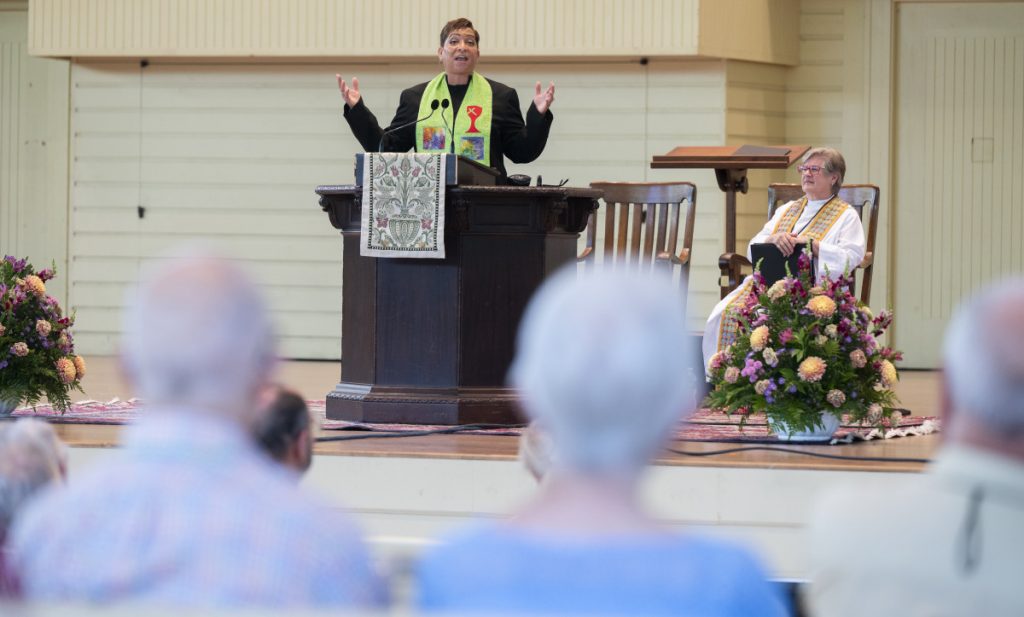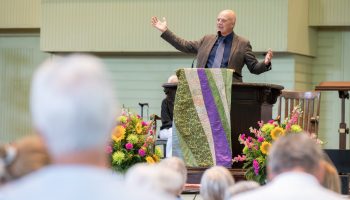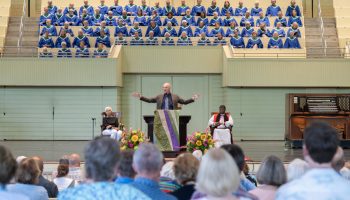Guest Column by Welling Hall
The Rev. Teresa “Terri” Hord Owens preached her sermon “Inside God’s Imagination” at the 9:15 a.m. ecumenical worship service on Wednesday, Aug. 10 in the Amphitheater. Scripture passages included 1 Corinthians 1:25-29 and Ephesians 3:20-21.
In January 2020, right before a global ministry trip, friends with theological chops asked Hord Owens, “What excites you about the Church?” She answered, “Courageous creativity.”
Opening the general board meeting of the Disciples of Christ in February 2020 as general minister and president, she told the members of her denomination, “We must imagine a new church for a new world.”

Sequestered in lockdown in the new world of the pandemic, she spent months rereading Walter Brueggemann’s seminal book, The Prophetic Imagination. Brueggemann’s book offers not only a critique of empire, but also suggests the power of alternative imagination for a prophetic church.
Hord Owens repeated the scriptural theme that God uses the foolish to confound the wise, and the weak to shame the strong. This is true, she said, both in the Bible and in the world we see around us. Moses was a political refugee, a confirmed murderer and he saw crazy things (like God in a burning bush). God chose Moses. Moses himself had excuse after excuse as to why he should not be chosen by God.
“I don’t speak well,” Moses said.
“I’ll send Aaron to assist you,” God said.
“No one will believe I have authority,” Moses said.
“Here’s a staff,” God said.
Yes, his disobedience to God prevented him from entering the Promised Land. Still, Hord Owens pointed out, Moses is a character of mythological stature who is the consummate prophet in pointing to and enacting a new world.
Pursuing another Biblical example, Hord Owens spoke of the prophet David. Samuel went to the house of Jesse to seek a leader, and he saw all the strong, handsome sons.
“Is this all?” Samuel asked.
“We have another,” they said. “He is small, unattractive and he smells bad.”
This small, smelly shepherd David is the one God chose to turn the world upside down. David understood the difference between lament and praise. He could shake his fist at God, but he always ended with praise.
Hord Owens gave Disciples of Christ pastor, the Rev. William J. Barber II, as an example of a contemporary prophet. As a young adult, Barber was afflicted with an illness. Doctors said he would not walk again. He was told that he could not work as a pastor.
As the leader of the Poor People’s Campaign, Barber has worked with communities to craft legislative policy proposals for state legislatures and for the U.S. Congress. He regularly critiques the way the world is, and imagines alternatives. Hord Owens said that she foresees telling her grandchildren that she saw the face of a prophet in Barber.
In contrast to Barber, Hord Owens described preachers who imagine themselves to be exceedingly gifted, who travel with an entourage, who require fancy titles and who have no time for common people.
Hord Owens said that it took a long time for her to hear her own calling and that her husband was her Eli, helping to raise her up. She knew she was no Cynthia Hale, Martin Luther King Jr. or Traci Blackmon. Her undergraduate degree was in government. She worked in information technology.
She believed that God would not use her because she did not fit. She refused to wear a masculine clerical collar to assert that she had authority. She never could have conceived the idea that she would lead a major Protestant denomination.
Again, God’s foolishness is better than our wisdom. In the 40th anniversary edition of The Prophetic Imagination, Brueggemann wrote, “We must get inside God’s imagination.” Hord Owens said that this means that we must listen to the ideas of new people, young people. It will take more than good programs and public relations. The church needs crazy creativity and bold justice.
We must listen to the brilliance of those people we believe have nothing to say. Only in this way can we discover another Moses, another David.
Hord Owens urged the congregation to be “Yes, and …” people rather than “Yes, but …” people.
We need to not say, “Yes, but we have no money,” or “Yes, but we don’t know enough.” Instead, we must say, “Yes, and God will provide,” or “Yes, and God can use people and things that confound us.”
We cannot know what God will do. God can act exceedingly, abundantly, beyond our understanding.
Citing Tuesday’s 10:45 a.m. lecture, Hord Owens lifted up Matthew Desmond’s statement that it is possible to eliminate poverty and housing insecurity. We need imagination to accept that God can do more than we can even think.
Hord Owens said that she saw creativity abound at Chautauqua. She urged the congregation to remember, when we are flagging, that we serve the One who is able to exceedingly, abundantly make all things new and to do all things. Whether you are Moses or David or Priscilla or Rahab, know that whoever you are, the One who begins the work in you will complete it.
The Rev. Paul Womack, pastor of Hurlbut Memorial Community United Methodist Church, served as liturgist. Melissa Spas, vice president for religion, read the Scripture. Organ Scholar Nicholas Stigall played the Prelude, “Variations on Holy Manna,” by Raymond Haan. The anthem, sung by the Chautauqua Motet Choir, was “Choose Something Like a Star,” by Randall Thompson, with lyrics by Robert Frost. Joshua Stafford, director of sacred music and Jared Jacobsen Chair for the Organist, played the Postlude, “Sortie en mi bémol majeur,” by Louis James Alfred Lefébure-Wély. Support for this week’s service is provided by the Geraldine M. and Frank E. McElree Jr. Chaplaincy Fund and the Robert D. Campbell Memorial Chaplaincy. Mary Lee Talbot will return as the morning worship columnist in the coming days.




